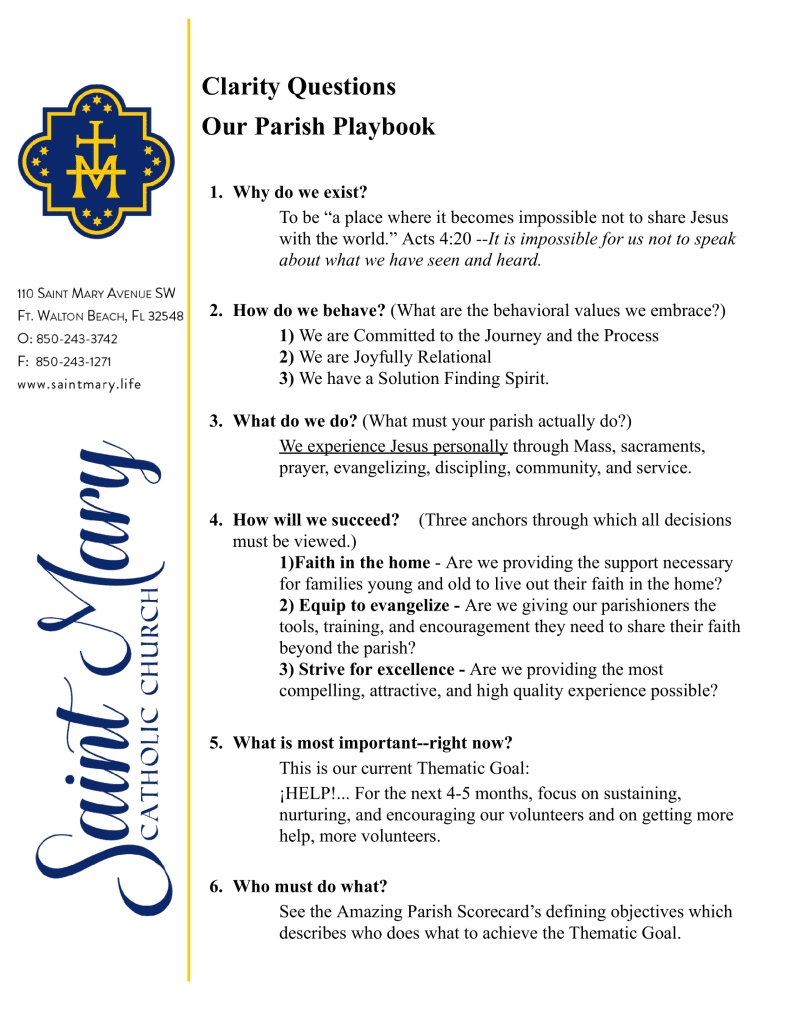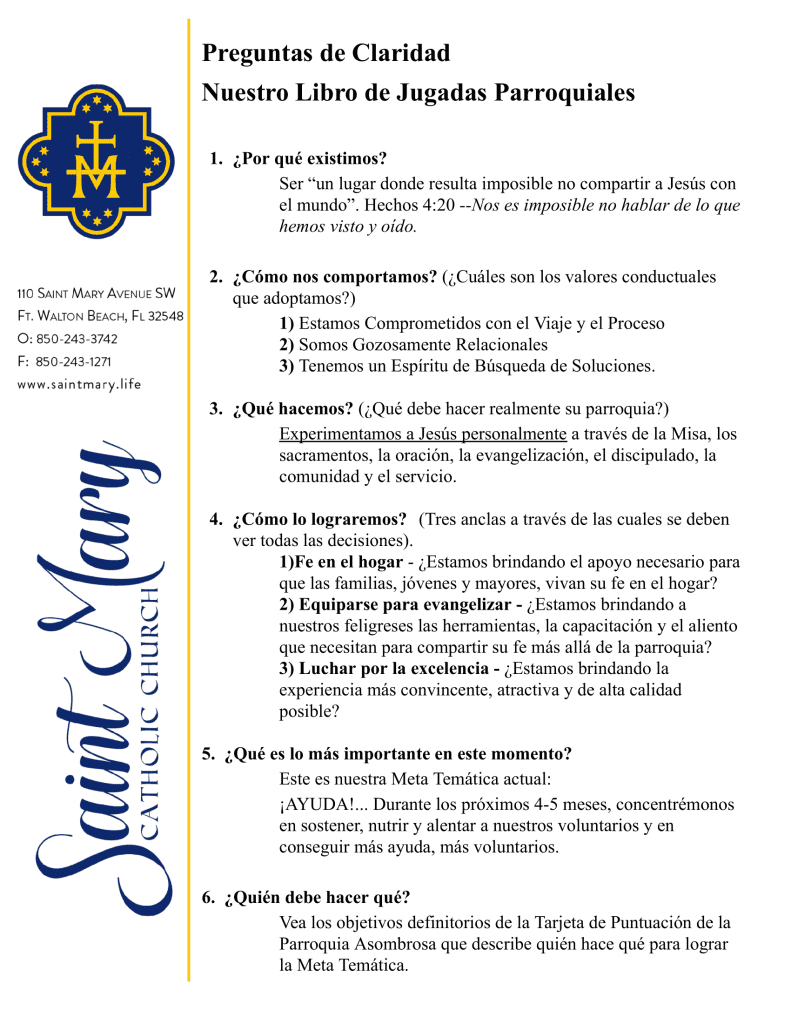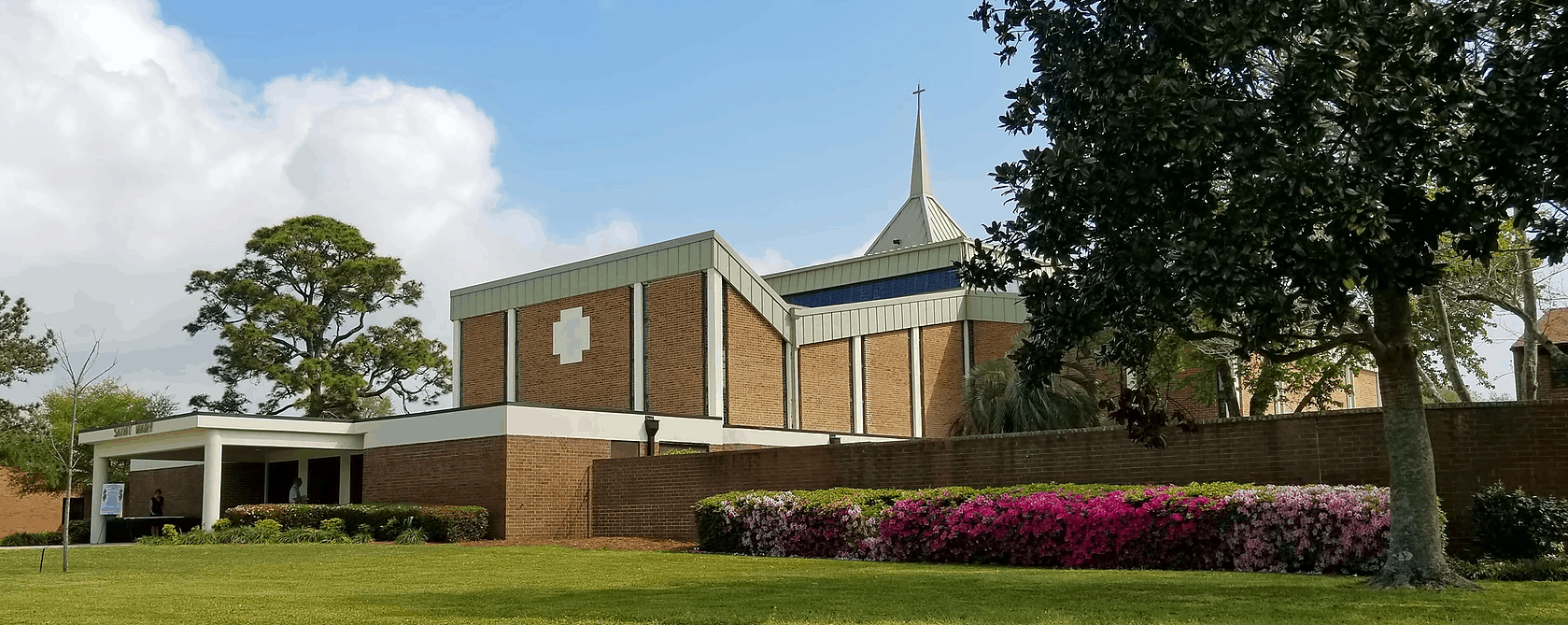Parish Finance Council
French Brown
Barbara Bowers
Edward Burns
Don Harrington
Kathi Heapy
Mr. French Brown would be happy to respond to any questions concerning our parish finances. Please use the form below to contact him.
Parish Leadership Team
Parishes are the most important organizations in the world. If this is true, and we are convinced that it is, then the leadership of the pastor is critical. He is the spiritual leader and executive authority of a parish. But he cannot run a parish alone, or in a hub and spoke manner that forces him to be responsible for most decisions. Great pastors surround themselves with a team of leaders who share the responsibility of leading the parish, and we call that team the Parish Leadership Team.
A parish leadership team exists to assist the pastor in managing the parish. This involves everything from strategic decisions and people management to operations and finances. It’s important to understand that the leadership team is NOT an advisory or oversight body, like the parish council or the finance council. The leadership team is an operating body, which means that each team member is actively involved in implementing the decisions of the team. It’s crucial that the leadership team of a parish meets weekly to look at the overall health of the parish. It’s also important for members of the leadership team to understand that being on the leadership team is NOT a reward or a privilege, but rather a serious responsibility. The pastor chooses his team, and he is the leader of the team.
Our Saint Mary Parish Leadership Team members are:
Tony Ferreira
Fr. Doug Halsema
Kim Solberg
Julie Anne Walker
The Four Qualities of a Parish Leadership Team Member
Committed and Present:
A committed parishioner (staff or volunteer) who is present at the parish during the week and available for weekly meetings.
Team Player:
A committed parishioner who is capable of being vulnerable, engaging in productive conflict, holding people accountable and being held accountable by the team.
Whole-Parish Oriented:
A committed parishioner who is focused on the collective results of the parish more than their individual area of concern.
Mature:
A committed parishioner who is mature, humble, prayerful, trustworthy and able to handle sensitive and confidential information.
5 Misconceptions of a Parish Leadership Team
What is a parish playbook?
A parish playbook defines for our parish what we should be doing as a parish. This is determined by looking at what Jesus tells us all Christians should be doing, looking at what the Catholic Church teaches us about what Jesus tells us, and looking at how all of that fits into our parish in Fort Walton Beach. We also look at best practices from Catholic parishes around the country to see what might assist us.
Why do we need a playbook? In sports, playbooks contain all the strategies, moves, diagrams, and tactics for a team. Memorizing a playbook is crucial for a team’s success. Our Playbook is a concise way for us to communicate the way we want to go about being Jesus’ followers at Saint Mary.
For a church to be healthy, everyone needs to be on the same page which doesn’t always happen in churches. In fact, it rarely happens. Most of the time, there are multiple people with their own agendas pulling in totally different directions. This leads to confusion, jealousy, turf wars, and church splits. Luckily, there’s a way you can prevent this. We just need to get everyone working from the same playbook.
Our playbook answers six questions: 1) Why do we exist? 2) How do we behave? 3) What do we do? 4) How will we succeed? 5) What is the most important, right now? 6) Who must do what?
We are sharing our playbook so that everyone can work together to accomplish our vision and mission. What does the bible have to say about this playbook idea? “Where there is no vision, the people perish.” Proverbs 29:18a
FROM FR. DOUG’S HOMILY:
The Lord speaks to us in the GospelAs we ponder James and John’s ambitious plea for seats of power, we’re reminded of humanity’s innate desire for prominence. Yet Jesus’ gentle rebuke whispers a different path: one marked by selfless sacrifice. As Jesus speaks, in the quietude of our hearts, a spark ignites. It’s a flame kindled by his Gospel, a call to embrace a life of radiant evangelization and humble service.
Our parish has chosen this path, a journey of selfless service. Titles or accolades do not drive you or me. What drives us is a burning desire to serve as Jesus commanded. He commands us to make disciples of all nations. He calls and sends us forth, not as mere messengers, but as living embodiments of the Gospel, igniting a fire of faith in other people’s hearts.
The Importance of Evangelization
Evangelization, sharing the gift of our faith, is the very essence of our faith. It’s not merely a task but a sacred art. It’s about inviting others into a transformative relationship with God, awakening within them a deep-seated love for him and his teachings. As followers of Christ, he sends us to share his message with unwavering conviction and infectious joy.
The Four Questions:
To guide us on this journey, we ask ourselves four profound questions which keep us focused on what we should be doing.
The First Question: Why do we exist?
Our parish exists not merely to gather, but to ignite. We’re a beacon, a flame burning so brightly with Christ’s love that it’s impossible not to be drawn in. Our desire is to become a catalyst, inspiring others to share the Good News with the world, we want to become a place where it is impossible for us not to go out and share Jesus with other people, just as the apostles were compelled to do.
A Parish of Disciples and Apostles
Our, Bishop Bill Wack, encourages us to grow as disciples and live as apostles. A disciple is a learner, a seeker of truth. An apostle is a messenger, a bearer of the Gospel. We are called to be both, continuously deepening our understanding of Christ while simultaneously sharing his message with the world.
The Second Question:
Our second question is: How do we behave as a parish that seeks to evangelize?
We are Joyfully Relational
Effective evangelization is a delicate dance, a harmonious interplay of relationships. It requires us to connect with others on a personal level, listen deeply, understand their needs, and offer them the hope and healing that only Jesus Christ can provide. When we approach evangelization with joy, love, and compassion, we become living examples of the Gospel, inspiring others to follow in our footsteps.
We have a Solution-Finding Spirit
Accentuate the positive and eliminate the negative. In our encounters with others, cultivate a solution-finding spirit. Instead of dwelling on problems, see potential. Offer encouragement, support, and guidance. Help others discover their unique gifts and talents to share with the Church. When we approach others with a positive and hopeful mindset, we can empower them to overcome challenges and live fulfilling lives in Christ.
We are committed to the Journey and the Process
Evangelization is a journey, not a destination. It requires patience, perseverance, and a commitment to the process. We must be willing to invest time and energy in building relationships, offering support, and providing guidance. Even when faced with setbacks or disappointments, we must remain steadfast in our faith, trusting that God works in mysterious ways.
The Third Question:
What do we do? When we look at the answer to this, most of us would say we are a Catholic Church; of course, we do those things. But notice the two words: “experience Jesus.” We do not want to merely do these things; we want to experience Jesus when we do them, and we want to help other people experience Jesus when they do them.
These seven things listed in the answer are not mere rituals of doing things; they are doors through which we experience the tangible presence of Christ in our lives. By actively participating in these seven areas and doing so with open, generous hearts, we will deepen our relationship with Jesus and experience his love, help, and peace in our lives.
The Fourth Question
Our fourth question is: How will we succeed?
If someone asks our parish to start some ministry, we do not do it if it does not meet these criteria.
- Faith in the Home: The home is the first church. Parents are entrusted with the sacred responsibility of teaching their children about God and passing on the faith and values that have shaped their own lives. We want to help parents do that.
- Equipping Our People to evangelize: As a faith community, we must equip our members to be effective evangelizers. This involves providing opportunities for you to be small group facilitators, providing spiritual formation, catechetical instruction, and practical training.
- Striving for Excellence: We are called to strive for excellence in all that we do. By setting high standards for ourselves, we can become more effective witnesses to the Gospel and a greater source of inspiration for others.
Conclusion
Today’s Gospel reading challenges us to reevaluate our understanding of greatness and leadership. It reminds us that true greatness is found not in recognition, titles, or self-promotion but in humble service and selfless love, which is hard work.
Through our four questions and responses we recommit ourselves to the work of evangelization and to the pursuit of a life of joyful service. May we be inspired by the example of Jesus, who came not to be served but to serve. May we be filled with the Holy Spirit and empowered to share the Good News with the world. May we share the Good News with joy and enthusiasm and strive for excellence in all we do.
Parish Playbook in English

Libro de Jugadas Parroquiales en Espanol


